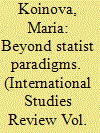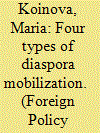| Srl | Item |
| 1 |
ID:
157537


|
|
|
|
|
| Summary/Abstract |
This article presents a new positional perspective for the analysis of diaspora mobilization in international relations (IR), seeking to shift debates beyond realist, liberalist, and constructivist thinking, and speaking to a cluster of sociopositional theories in IR. It provides a conceptual discussion and empirical illustrations of diaspora positionality—the power diaspora activists derive from their sociospatial positions in particular contexts—and its utility to account for different mobilization trajectories. Positionality as a sociospatial concept offers opportunities to analyze diaspora politics beyond statist paradigms, dominated by analyses of triadic relationships between diasporas, host states (immigration states), and home states (sending states). Diasporas have links to many contexts beyond host states and original home states. Such linkages structure their relationships globally. If diaspora entrepreneurs perceive themselves as deriving strong powers to achieve homeland-oriented goals from a particular sociospatial context, they are more likely to pursue claims through institutional politics and moderate means. If they perceive themselves as deriving weak powers from a context, they are more likely to engage with activist networks and pursue claims in transgressive ways. The conceptual discussion engages aspects of diaspora positionality in juxtaposition with other spatial concepts such as geographical proximity/distance and position in a social network. The empirical discussion brings patterns of mobilization trajectories from the Armenian diaspora mobilization for genocide recognition and the Palestinian diaspora mobilization for statehood, informed by a rich multisited fieldwork.
|
|
|
|
|
|
|
|
|
|
|
|
|
|
|
|
| 2 |
ID:
124616


|
|
|
|
|
| Publication |
2013.
|
| Summary/Abstract |
This comparative study explores the conditions and causal pathways through which conflict-generated diasporas become moderate or radical actors when linked to homelands experiencing limited sovereignty. Situated at the nexus of scholarship on diasporas and conflict, ethnic lobbying in foreign policy, and transnationalism this article develops four types of diaspora political mobilization-radical (strong and weak) and moderate (strong and weak)-and unpacks the causal pathways that lead to these four types in different political contexts. I argue that dynamics in the original homeland drive the overall trend towards radicalism or moderation of diaspora mobilization in a host-land: high levels of violence are associated with radicalism, and low levels with moderation. Nevertheless, how diaspora mobilization takes place is a result of the conjuncture of the level of violence with another variable, the linkages of the main secessionist elites to the diaspora. The article uses observations from eight cases of Albanian diaspora mobilization in the US and the UK from 1989 until the proclamation of Kosovo's independence in 2008.
|
|
|
|
|
|
|
|
|
|
|
|
|
|
|
|
| 3 |
ID:
188957


|
|
|
|
|
| Summary/Abstract |
Why does the Hong Kong diaspora mobilize transnationally to support the Anti-ELAB Movement back home? How do overseas mobilizations help sustain movement during its abeyance period? Building on the theoretical grounding from transnational movement and diaspora studies, I identify four dimensions of transnational ties that diasporas have with their homeland—relational, political, cultural, and identity and value—and examine their effect on diasporic activism in the host countries. Using original survey data on Hong Kong Americans and interviews with members of overseas Hongkonger groups, I demonstrate that attachment to Hong Kong culture and localist values are the strongest drivers for transnational engagement.
|
|
|
|
|
|
|
|
|
|
|
|
|
|
|
|